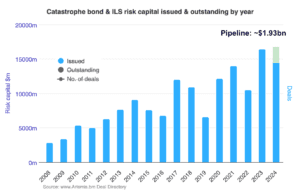Solving AI risks requires proper coverage knowledge

Solving AI risks requires proper coverage knowledge | Insurance Business America
Risk Management News
Solving AI risks requires proper coverage knowledge
No single policy covers all possible exposures
Risk Management News
By
Kenneth Araullo
Generative artificial intelligence (Gen AI) is steadily transitioning from an emerging technology to a strategic tool within financial institutions. According to Anthony Rapa, senior client advocate, corporate risk and broking at WTW, most companies are in the early adoption phase, focusing on establishing governance frameworks, assessing risks, and understanding how Gen AI integrates into their broader plans.
Initially, Gen AI is being utilised in back-office operations to boost efficiency through increased productivity and automation of routine tasks. Over time, it is expected to play a more prominent role in the front office, aiding customer engagement and fostering the development of innovative advisory and financial products.
“Managing the risks associated with Gen AI is like solving a complex puzzle — no single insurance policy covers all potential exposures. Instead, a comprehensive risk management strategy must be pieced together using various policies from your insurance portfolio,” Rapa said.
As a general-purpose technology, Gen AI can be integrated into diverse applications, affecting nearly every aspect of a financial institution’s operations. This integration can significantly alter existing risk profiles and introduce new, potentially unaddressed risks.
These risks include bias and explainability, as the complexity of AI models makes their decisions difficult to explain, and these systems can inadvertently reflect and perpetuate biases present in their training data.
Quality concerns and hallucination are also prevalent, with limited training data or a lack of originality potentially resulting in the production of plagiarised content. Over-reliance on AI poses another risk, as increasing capabilities might lead to excessive dependence without adequate critical evaluation.
Companies that depend on external parties might face risks related to the reliability, security, and continuity of those services, while internal resources need investments in talent and data storage. Rapid AI advancements may outpace regulatory developments, leaving companies in uncertain legal environments.
AI’s complex algorithms and data use heighten risks related to intellectual property and data privacy. Gen AI tools can be misused for social engineering attacks, financial scams, and creating sophisticated fake identities. Determining fault when Gen AI makes decisions can be challenging. The unpredictability of generated outputs complicates the establishment of clear content moderation guidelines.
Biased or erroneous data can lead to inaccurate outcomes, amplifying misjudgements and disparities. AI applications can raise ethical issues, such as in facial recognition, surveillance, or autonomous decision-making in sensitive areas like healthcare and criminal justice. Lastly, AI adoption may lead to job displacement and unemployment.
Managing the risks that come with Gen AI
To manage these risks effectively, financial institutions should consider a multifaceted insurance approach. Cyber insurance is critical for addressing the increased vulnerabilities and data privacy concerns introduced by Gen AI.
According to the 2024 Global Directors’ and Officers’ Survey Report, cybersecurity remains a top priority for business leaders. Employment practices liability (EPL) insurance will be essential as Gen AI drives significant workforce changes, necessitating new approaches to talent acquisition and team structuring. This shift will require firms to adapt their hiring practices and reorganise teams to leverage Gen AI capabilities fully.
Professional indemnity/errors and omissions (PI/E&O) insurance covers the use of Gen AI in professional services, including financial advice and portfolio management. Casualty insurance, often associated with “slip and fall” incidents, can also cover personal and advertising injury, relevant when Gen AI-generated content inadvertently uses copyrighted materials. Intellectual property (IP) insurance is becoming increasingly sought after by financial institutions to protect against infringement risks posed by Gen AI.
Property insurance, a first-party coverage, safeguards physical infrastructure and business continuity, although it does not cover many liability and regulatory risks posed by Gen AI. Fidelity/bond/crime insurance protects against losses from employee theft, fraud, and computer crime, all of which are impacted by the adoption of Gen AI.
Directors and officers (D&O) insurance is essential for protecting leadership during the Gen AI adoption phase, addressing various risks and liabilities that flow up to a firm’s leadership.
“Managing the risks associated with Gen AI requires a comprehensive and holistic approach. Financial institutions must consider how each piece of their insurance coverage fits together to form a complete risk management strategy. Addressing the unique challenges posed by Gen AI across various policies helps protect against potential exposures,” Rapa said.
This strategy should include scenario analysis and crisis response planning to reveal coverage gaps and necessary improvements. Cross-policy coordination is vital, ensuring alignment across policies by scrutinising coverage provisions and other clauses. Advanced analytics should be utilised to understand the firm’s unique risk profile instead of relying solely on benchmarking.
Proactive engagement with underwriters can demonstrate a firm’s superior governance framework and understanding of risks, which can be crucial for renewal success as the market and risks continue to evolve.
What are your thoughts on this story? Please feel free to share your comments below.
Keep up with the latest news and events
Join our mailing list, it’s free!





